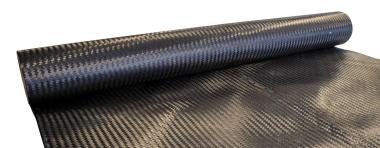New Braided Fabric for Scalable Composite Manufacturing
Teijin Carbon, in collaboration with A&P Technology, announced a joint innovation in advanced composite materials. IMS65 PAEK Bimax® biaxial fabric is a rate enabling solution using Teijin Carbon’s Tenax™ TPUD IMS65 PAEK product, a thermoplastic unidirectional (UD) tape. It is designed to meet growing demand for scalable, high-speed production of composites in aerospace, space, defense and other evolving markets.
Teijin’s Tenax™ TPUD IMS65 PAEK – a high-quality UD tape based on polyaryletherketone (PAEK) resin is slit into narrow widths and braided by A&P Technology into a 65” wide +/-45° fabric. The +/-45° braid architecture has minimal crimp- offering a high translation of tape properties while providing excellent drapability for complex geometries. With a fiber areal weight of just 184 gsm and 34 percent PAEK content, IMS65 PAEK Bimax® enables out of autoclave (OoA) processing and vacuum bag only (VBO) consolidation, significantly reducing manufacturing time while enhancing mechanical performance and impact resistance.
Features and benefits of IMS65 PAEK Bimax® fabric:
- High fiber volume and low crimp for superior mechanical performance
- Extreme drapability for deep-draw parts
- Reduced lay-up time per layer – 65” wide fabric enables quick laydown of biaxial reinforcement
- Native air evacuation pathways for optimal consolidation of thick components
- Room temperature preform placement with spot tacking to simplify production workflows
This innovative braided fabric meets or exceeds the properties of existing National Center for Advanced Materials Performance (NCAMP)-qualified PAEK prepregs, offering a robust and scalable solution for next-generation composite structures. The combination of Teijin Carbon’s advanced thermoplastic UD tape technology and A&P Technology’s expertise in braided fabric manufacturing delivers a truly high-performance solution for modern composite applications.
Teijin Carbon Europe Teijin Carbon Fibers A&P Technology Composites braided fabric composite materials Teijin Carbon Europe GmbH
Teijin Carbon Europe GmbH








